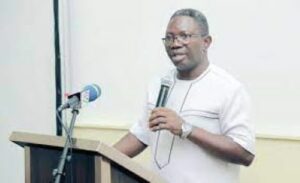Ghana government asked to invest in prevention of HIV

Dr Kyeremeh Atuahene, the Director-General of the Ghana AIDS Commission, has asked the government to invest more resources in the prevention and treatment of HIV.
That, he explained, would reduce the rate of infection and save the country from any future explosion of the HIV epidemic.
Dr Atuahene said the budget for the Commission’s preventive and treatment care for HIV intervention programmes was low, saying “we only have about a third of the money we need for HIV aactivitie”.
The financing gaps, he stressed, had affected the Commission’s implementation of HIV preventive activities, resulting in high levels of multiple sexual partnerships, among others.
The Director-General said this in an interview with the Ghana News Agency on a survey report conducted by the Ghana Statistical Service on HIV and AIDS in the country.
The report, dubbed: “The 2022 Ghana Demographic and Health Survey”, showed that two per cent of women age 15–49 had sex with more than one partner, of which 12 per cent used condoms.
The report revealed that 15 per cent of men age 15–49 had sex with more than one partner in the 12 months before the survey, while 18 per cent used condoms.
Dr Atuahene said for the country to achieve the national target of condom use for men and women, people involved in multiple concurrent sexual partnerships and casual sex must use condoms consistently and correctly to prevent HIV infections.
He said the national target for women on condom use was 55 per cent, while that of men was 65 per cent, but the survey revealed 23 per cent for women and 34 per cent for men.
He encouraged Ghanaians to recognise that the responsibility of protecting themselves against HIV infections was in their hands and that they must take measures to avoid getting infected.
“It is possible to live free of HIV if you take the necessary steps by committing yourself to condom use, having one uninfected partner, or abstaining from sex,” he said.
He called for strong political will that would inject resources to support the implementation of HIV policy and programmes.
The survey is the 7th report conducted in the country since 1988, designed to provide data for monitoring the population and health situation in the country.
The survey was conducted by the GSS with funding from USAID, UNICEF, UNFPA, World Bank, the Global Fund, KOICA, World Health Organisation, and the Foreign, Commonwealth, and Development Office.
A nationally representative sample of 15,014 women age 15–49 in 17,933 households and 7,044 men age 15–49 in half of the selected households were interviewed.
The survey represents a response rate of 98 per cent of women and 97 per cent of men.
Source: GNA
